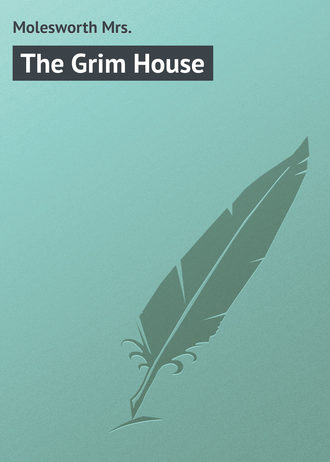
The result was, that I felt, and probably appeared, very cross. But an unexpected distraction of my thoughts was in store. That afternoon’s post brought two letters for me, both with the same news, though from different sources. One was from mother and one from Moore.
They announced that an epidemic of some kind, though not of a very serious nature, had broken out in his “house,” and that the boys were disbanded for two or three weeks, Moore amongst them, as no exceptions could be made under the circumstances, though as it was an illness he had already had, he was considered proof against infection.
“He is coming home,” wrote my mother, “at once. It is a great pity, and I shall not know what to do with him alone here. He will miss you so dreadfully. If it were not a shame to propose it, I should be inclined to shorten your visit.”
And Moore’s lamentations were even more outspoken.
“Do come back as soon as ever you can, Reggie,” he wrote. “I really can’t stand home without you, and you can go back to Millflowers again later.”
I looked up gravely.
“Isabel,” I exclaimed, “I must go home;” and I told her what my letter contained.
Isabel looked greatly distressed.
“Oh, no, Regina,” she replied, “you cannot leave us yet. You have been here barely a fortnight, and you were to stay five or six weeks at least. I should feel so unhappy if you left just now,” she went on, “for – I don’t quite know how it is – I feel as if I had been rather disagreeable to you about that tiresome old Grim House, but I am sure I didn’t mean to be so. Only – ”
“You are quite right,” I replied; “quite right not to do anything that you are at all afraid might vex your father;” at which Isabel’s face cleared. She little suspected that I was saying to myself that I, not being Mr Wynyard’s daughter, was not restricted in the same way.
“I am so glad,” she said, “that you see it that way now, for that is my principal reason, though it is true too that I am naturally cowardly in some ways. I have not got your spirit and love of adventure. But as to your going home now, it really cannot be thought of. We must plan something. Stay! I have got an idea. Wait here a moment, Regina; I will be back directly.”
She ran off to look for her father, I felt sure. We were sitting in the drawing-room; it was nearly tea-time, and in a few moments she reappeared, followed by Mr Wynyard, her face fall of pleasure.
“It is all right,” she began. “I knew it would be. Regina, Moore is to come here as soon as it can be managed. Father says so.”
“Yes,” Mr Wynyard agreed, “it is by far the best solution of the difficulty. There is no fear of infection. Isabel has had all these childish illnesses long ago – and you too, Regina, I suppose? Otherwise your mother would not think of your returning home to meet your brother.”
“Yes,” I answered, “Moore and I, and Horry, I think, had scarlet fever and all these things together. It would be quite delightful to have Moore here, if you are sure he would not be at all in the way. He is really not a tiresome kind of boy, I must say.”
“No, indeed,” exclaimed Isabel. “We saw that at Weissbad, when he was so often alone with you and me, Regina, and quite content with our society.”
“In some ways,” I said, “the others call me more of a boy than him at home;” and I reddened a little, feeling half ashamed of the confession before Mr Wynyard. But he did not seem to mind it; rather the other way indeed.
“It would do Zella no harm to have a little of the boy element instilled into her,” he said with a smile. “But there is no time to be lost in arranging this new plan. Let me see! Must Moore go home first? Yes, I suppose it is on the way.”
“I think it would be better,” I replied. “Winchester is really only a short way from home, and he is sure to want to pick up things there. I do hope father won’t think it too far for him to come for so short a time.”
“It need not be so short a time, as far as we are concerned,” said Mr Wynyard hospitably. “But of course the boy will have to get back to school again whenever he can. I’ll tell you what,” he went on, “I will write to your father myself, which I think will ensure Moore’s being allowed to come.”
“Oh, thank you,” I said gratefully, and indeed I felt so.
“Your father is very kind,” I said to Isabel when we were by ourselves. “I am getting to feel much less afraid of him.”
Isabel looked pleased at this.
“I told you so,” she said. “I can’t imagine being afraid of him unless I knew I was doing something wrong.”
Her words recalled our discussion about the Grim House.
“I know,” I thought to myself, “who would sympathise with me about it to the full, and that’s Moore. I wonder if I dare tell him.”
Then another warning returned to my mind – that of Jocelyn.
“How curious that he should have thought of such a possibility as Moore’s coming here,” I said to myself. “I feel half inclined to look at things from the ‘Kismet’ point of view. ‘What is to be, will be.’ If Moore’s coming here helps me to go on with my investigations without involving Isabel, which I now see I have no right to do, it will seem as if it was all meant. That’s to say, if I make up my mind to tell him about it, in spite of Jocelyn’s fatherly advice.”
And in my heart I think I knew that I should never have the resolution to keep the fascinating subject to myself, once Moore was on the spot.
All came to pass as we had hoped. Moore arrived, brimful of delight, and very much inclined to think the epidemic at school an unlimited subject of congratulation. He was looking very well, I was pleased to see – altogether in a mood for viewing everything with rose-coloured spectacles.
“This is a jolly place, Regina,” he confided to me when we were strolling about the first morning after his arrival, I acting “cicerone,” as Isabel was engaged in her housekeeping cares. “Now I hope you’ll give me some credit for knowing what I’m about when I make friends with people! Do you remember how angry you were that day at Weissbad when I came in and told you I had been speaking to the Wynyards? Even mother looked rather funny about it.”
“What nonsense!” I exclaimed. “Angry! I wasn’t the least angry! I was only rather shy at the idea of making new acquaintances.”
“And the Paynes,” Moore resumed, “they were thoroughly nice people too. By-the-bye, Reggie, I forgot to tell you that Leo, the youngest, is almost sure to come to my ‘house’ next term. I knew that he was down for Winchester, but I had no idea we’d be together. It isn’t quite certain yet – it depends on a vacancy.”
“That will be nice for you,” I replied, half absently. Not that I had not taken in what he said, but that his mention of the Payne family had recalled to me Rupert’s talk of sensational stories, “facts stranger than fiction,” which had come to his knowledge, and I began wishing that I could see him again to talk over the Millflowers mystery, now that I had seen for myself the Grim House and its inhabitants. But on that occasion I did not allude to it to Moore.
For some days our pleasantest anticipations were realised. Moore proved a great acquisition in our drives and walks. Mr Wynyard encouraged to the full everything of the kind, and gratified me more than once by saying that active exercise in the open air, and all that sort of thing, was “so good for Isabel.”
“A little roughing it would really do her no harm,” he said. “She is as unselfish and conscientious as she can be, but life has been in some ways perhaps too sheltered for her. I don’t know how she could ever stand alone, as she may have to do any day,” he added with a little sigh which touched me.
“But you are not at all old, Mr Wynyard,” I said, rather brusquely perhaps. “You can’t be older than father, and we look upon him as – oh! quite a young man. Then, too, Margaret, Mrs Percy, and her husband are devoted to dear Zella!”
“Yes,” he agreed, “but still the best of brothers and sisters are not like a parent, and I suppose, to confess the truth, I have spoilt Zella a little. Circumstances seemed to make it inevitable.”
I knew that he alluded to his wife’s death, so I said no more. But the effect of this little conversation was, I now see, somewhat to increase my own self-confidence, and rather to lead me to think more than heretofore that in some ways Isabel was babyish, and almost morbid in her scrupulous conscientiousness.
Between us, with the best intentions in the world, her father and I at this juncture went rather to an extreme with poor Isabel. She was very far from being as strong as I constitutionally, and when she hung back, as happened now and then, from any scheme of long walks or drives, which Moore and I, in spite of his past delicacy, felt quite equal to, we urged her joining us, Mr Wynyard always endorsing what was said.
“You mustn’t be lazy, my dear child,” he would say rallyingly; “now that you have got companions you must profit by them.”
And she always gave in, accusing herself of want of energy and spirit, when in reality she was not fit for what she attempted.
I have often felt sorry, now that years and greater experience have taught me better – I have often felt sorry to think of the efforts dear little Isabel must have made in order to keep up with us and to please her father. But after all, no very great harm was done, for the poor child caught cold one day through getting drenched in a thunderstorm, which necessitated a visit from the doctor, who had known her all her life, and who pronounced her decidedly “below par.”
Any suggestion of chest danger terrified Mr Wynyard, for Zella’s mother had died of consumption; so her catching cold was probably a benefit in disguise, as it put a stop once for all to her forcing herself to do more than she was able for. She took it to heart so much, that Moore and I felt on our mettle to prove to her, and indeed also to Mr Wynyard, who blamed himself almost unduly, that we could manage to amuse ourselves very well indeed in spite of our regret at her absence. For fully a week she was not able to go out at all, and during that week – well, I must narrate what happened circumstantially.
I think it was on one of our expeditions before Isabel fell ill, and not many days after his arrival, that Moore, on our return to Millflowers one evening down the hill-road, noticed the Grim House for the first time. Hitherto I had not mentioned it to him. I think I was secretly a little afraid of awakening his curiosity on the subject, and conscious that if I talked of it at all, I should probably be tempted to tell him all I knew.
He stopped short, I remember, at the point on the road whence the best, in fact the only, view of the place was attainable.
“What a gloomy-looking house!” he exclaimed. “It might be a small prison or a private lunatic asylum.”
“On the contrary,” said Isabel. “Such places, asylums at least, are now-a-days very cheerful-looking, I believe.”
“But what is the place?” he asked, and Isabel told him, shortly enough, that it was a private residence, though its inhabitants kept very much to themselves, and then she changed the subject. Something in her tone, however, must have struck him, though she said so little, for afterwards, when we were alone – I cannot quite remember if it were the same day, or not till we were again passing the spot – he alluded to it.
“Is there anything queer about that house?” he inquired. “Isabel seemed mysterious! Is it haunted or anything of that kind? How jolly it would be if it were,” and his eyes gleamed. “I’d find my way into it somehow, and make the fellows stare at my adventures when I get back to school.”
“No,” I said cautiously, “it is not haunted;” but my tone – perhaps I did it purposely – only stimulated his inquisitiveness.
He glanced at me suspiciously.
“It is something, then?” he exclaimed. “And you know about it, and don’t mean to tell me! It’s too bad! You know you can trust me if it’s a secret.”
“It isn’t exactly a secret,” I replied. “But if I do tell you, Moore, you must promise me – solemn word of honour – that you’ll not – ”
I stopped and hesitated. It was rather difficult to say what I wanted him to promise, for the very suggestion that he was not to think of doing certain things was enough to put them into his head.
“Promise you what?” he asked, seeing my hesitation.
“Well,” I resumed, “that you won’t do anything in the way of trying to discover the mystery – for a mystery there is – without telling me.”
The word was enough. The boy would have promised me anything and everything under its fascinating influence.
“Of course I will,” he replied. “Honour bright! So fire away, Regina.”
So I did as he asked, and before we reached home, my brother was as fully versed in the whole details of the queer story as I was myself, inclusive of my own bit of adventure, the advent of the stranger; not to speak of a very fair amount of entirely groundless speculations which I had got into the habit of indulging in.
Chapter Six.
The Black Curtain
Moore listened in almost breathless silence, only interrupted now and then by muttered ejaculations, and when I had finished he looked up, his eyes sparkling, and said solemnly —
“It’s as good as a haunted house any day, Reggie. I never heard such a jolly mystery. Close at hand too! I do wish I had been with you the day you got inside. I fancy I can see you and Isabel scuttering off like two frightened rabbits,” and here he broke out laughing.
This I did not altogether approve of.
“If you treat it in that way,” I said severely, “I shall wish I had not told you anything about it. It is no laughing matter, that I can see. It is terribly sad to think of these poor people being forced, or thinking they are forced, to lead such a life. I should be so glad to find out any way of helping them.”
My tone sobered the boy, but he did not pretend to be influenced by any such high motives as those which I persuaded myself actuated me, far more than idle curiosity.
“I don’t see that you or any stranger could possibly be of the least use to them,” he said. “All the same I’d give anything to find out about it, and I don’t see but what we might make some investigations without doing any one any harm. You are plucky enough for anything – not like Isabel; and just supposing, Reggie, that there is somebody shut up there that no one has ever seen; that man you met might be a kind of a keeper.”
“He was a gentleman,” I replied.
“He might have been some sort of a doctor,” said Moore consideringly.
“And don’t think for a moment,” I said, without noticing his last remark, “that they are the kind of people to do anything wicked or cruel. They are the sufferers themselves, of that I am certain.”
“I’ll have a good look at them in church next Sunday,” he replied. “I do remember noticing them in their big square pew, and thinking they looked gloomy and queer, but I could not see them very well from where I sat. Have you been back to the door in the wall again to see if it is still open?”
I shook my head.
“No,” I replied, “I have kept quite out of the way of it since Isabel got so frightened. Indeed I have not spoken to her about it for some time, and I have often thought how much I should like to tell you about it; I knew you’d be so interested. Only, Moore – remember what you have promised,” I added impressively.
“Of course I shall,” he replied. “You’ve never known me break my word, now, have you, Reggie?”
“No,” I allowed.
“And I’m not going to do such a thing this time,” he continued. “Besides, it would be a mean sort of trick to start anything on my own account, and keep you out of the fun.”
“It is not fun I am thinking of,” I replied, with some indignation.
“Oh well, you know what I mean. You’d like awfully to find out what is at the bottom of it all, and so would I. We needn’t say more than that. I don’t suppose we shall find out anything, but the mere idea of it is so interesting. I wonder what the house is like inside. Are the windows barred, do you know?”
“Not that I have seen,” I replied. “Certainly not on the side where Isabel and I were. And you can see for yourself that there’s nothing of the kind on this side,” for, as I said, we were standing on the hilly ground from which two sides of the Grim House were fairly well within view. “No, Moore, I don’t believe in your theory of some one being shut up there. It would have come out to a certainty through the servants. I told you they have no old servants of their own; they just get them in the neighbourhood like other people.”
Moore whistled softly and swung his legs about. When I said we were “standing,” I should rather have said “sitting,” he on the top of a high gate, the entrance to a sloping field, I on the lower step of a stile at one side. I detected a note of incredulity in his manner.
“No,” I repeated, “I am certain there is no one shut up there – not even a – ”
“What?”
“Oh I don’t know – a tiger, or a pet boa constrictor, as there was in a story I read the other day,” I said carelessly. “Anything you like. No, there is nothing in that idea, Moore.”
“Well,” he replied, “we shall see, or very likely we shall not see. But at worst I’m determined to have a go at finding out something before I leave Millflowers, and of course you will help me, Reggie. You see I can’t do anything on my own account because of my promise to you.”
I trusted him, yet I felt uneasy, and almost began to regret my confidences. He would certainly not mean to break his word, but still – he might be sorely tempted, and he was only a boy. If, for instance, he was passing the door in the wall and found it ajar, what boy nature could resist, like Bluebeard’s wife, peeping in; and once within the enchanted precincts! No, I had myself to thank for it; I had laid the train, and I must see to the consequences.
“There is really nothing to do,” I began, trying, now that it was too late, to wet-blanket the boy’s curiosity.
“There’s lots to find out,” he interrupted. “You have been thinking and wondering ever so much about it yourself. You know you have. And if I keep my promise, as of course I shall, you mustn’t fight off poking about a bit, to see what we can see. We needn’t get into mischief or bother anybody. Isabel and her father need never know we go near the place. I should never do anything half as risky as you and she did the other day.”
“What is it you want to do?” I asked, with a curious mixture of feelings. I was afraid, though I scarcely knew what I was afraid of, and yet in a sense pleased to be, as it were, forced into prosecuting some investigation into the mystery which had so fascinated my imagination.
Moore did not at once reply. At some risk to his equilibrium, he managed to raise himself to a standing position on one of the higher bars of the gate, and gazed before him intently. Of course I did not need to be told in what direction he was gazing.
“It seems to me,” he said at last, “so far as I can understand from your description the spot where the door is – it seems to me that if we got in by it, we could creep round to the front of the house – I mean to a part from where we could have a good view of the front, and see the windows and anything there is to be seen – behind the bushes, without coming out into the open at all. That would be grand, wouldn’t it, Reggie?”
My first impulse was to exclaim delightedly in agreement, but there came misgivings again. I had not, so far, contemplated anything so audacious. Still, Moore, as he turned towards me interrogatively, must have seen the gleam in my eyes. He was as sharp as a needle.
“Oh,” I replied, “that would really be trespass. We must not do as much as that – just supposing we were seen? What could we say for ourselves?”
“Just supposing we are not seen,” he said with boyish pertness. “Nonsense, Reggie – trust me for that.”
“Or if there are dogs about,” I went on.
“You’d have seen them, or they would have scented you that other day to a certainty. Besides, if there were, dogs always like me. I can always smooth them down,” which was true enough. I had seen it tested more than once. Moore was one of those persons naturally gifted with a curious power over animals. “I don’t say,” he continued, evidently anxious to impress me with his caution and sobriety of judgment, “that I’d care to tackle a bloodhound or even a mastiff. But it’s most unlikely that they have any fellows of the kind about the place. It would be known.”
This too was a reasonable presumption. Still I shook my head.
“All the same, we shall be doing a thing we have no right to be doing,” I persisted.
Moore shrugged his shoulders.
“If you go at it like that, there are a good many things we’d better not do,” he said. “We’ve no right to pick mushrooms in old Porson’s fields at home, but no one has ever found fault with us for it.”
“Oh, that’s quite different,” I replied. “However,” for I was anxious to drop the subject as far as possible, knowing by experience that once Moore got into an argument it was not easy to dislodge him without giving in entirely, “the first thing to be done is to look for the door in the wall, for if it is locked, there’s an end to everything,” though as I said the words, Jocelyn’s ominous prediction, “he’d be scaling the walls and goodness only knows what,” returned to my memory. “That was a stupid speech of mine,” I said to myself. “Just the thing to start him on some wild scheme.”
And I now began to hope fervently, from the side of expediency as well as of curiosity, that the door should not be locked.
Moore took no apparent notice of my last remark, but after events proved that he had not only heard, but thoroughly digested it.
We had no opportunity of prosecuting our researches that day or the next. For “to-morrow” turned out an appallingly wet day – so drivingly rainy and wretched, that even Moore’s ardour was damped, and he stayed indoors contentedly enough. I did not know how he was amusing himself, but he told me afterwards that he had been making a “plan” of Grimsthorpe House, or rather of its position and grounds so far as he had been able to get them into his head from his own observations and my descriptions. He had also made preparations for the adventure he was determined not to be balked of, in other ways. He stuffed his pockets with strong cord, an old geological hammer and chisel of Mr Wynyard’s, which he had found in a drawer and taken possession of with Isabel’s leave, a feather and small bottle of oil, and all the unused keys he could lay hands on, and, last not least, in spite of his contempt for my suggestion, a large piece of dog-biscuit, to be on the safe side in case of canine opposition to our visit.
And the next afternoon I found myself “in” for it. There was no evasion of my promise even had I heartily wished to get out of it.
It was not very early when we set off, as I had in the first place been for a drive with Isabel, the doctor having given leave for this as soon as the weather grew milder, and to-day had turned out peculiarly fine after the storms of yesterday.
Moore was waiting for me when we came in.
“I want Reggie to go a little walk with me,” he said, half apologetically, to Isabel. “She wasn’t out all yesterday, and she’ll be getting too fat if she doesn’t have exercise.”
Isabel laughed. At that stage in my career there seemed little likelihood of the danger he alluded to. For strong and wiry as I was, I was decidedly thin.
“Don’t be late for tea,” she said, as we turned away; but Moore called back —
“Don’t expect us till half-past five; it is more than four already. It doesn’t matter about tea.”
“Speak for yourself,” I said to him when we were out of hearing. “I do mind about tea, and I don’t suppose you’ve got a private invitation from the Greys to have it with them.”
“Who knows!” said Moore jokingly. “Perhaps they’ll fall in love with us at first sight and ask us to go in.”
Even though I knew he was joking, what he said startled me. I stopped short in the path and turned round, facing him.
“Don’t talk nonsense,” I said warningly.
“Who began it?” he replied. “I was only following up what you said.”
“Well, but seriously,” I resumed. “I hope you are not in a wild humour, Moore, meaning to do anything reckless?”









